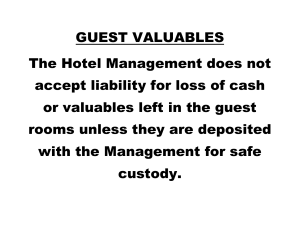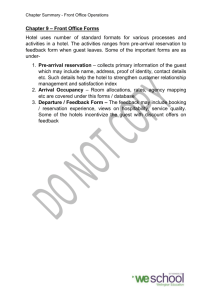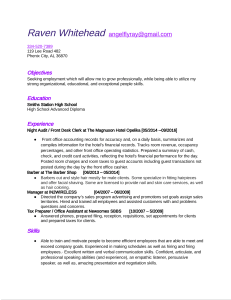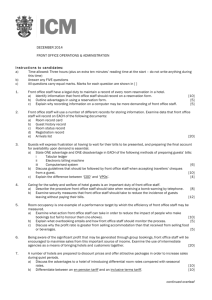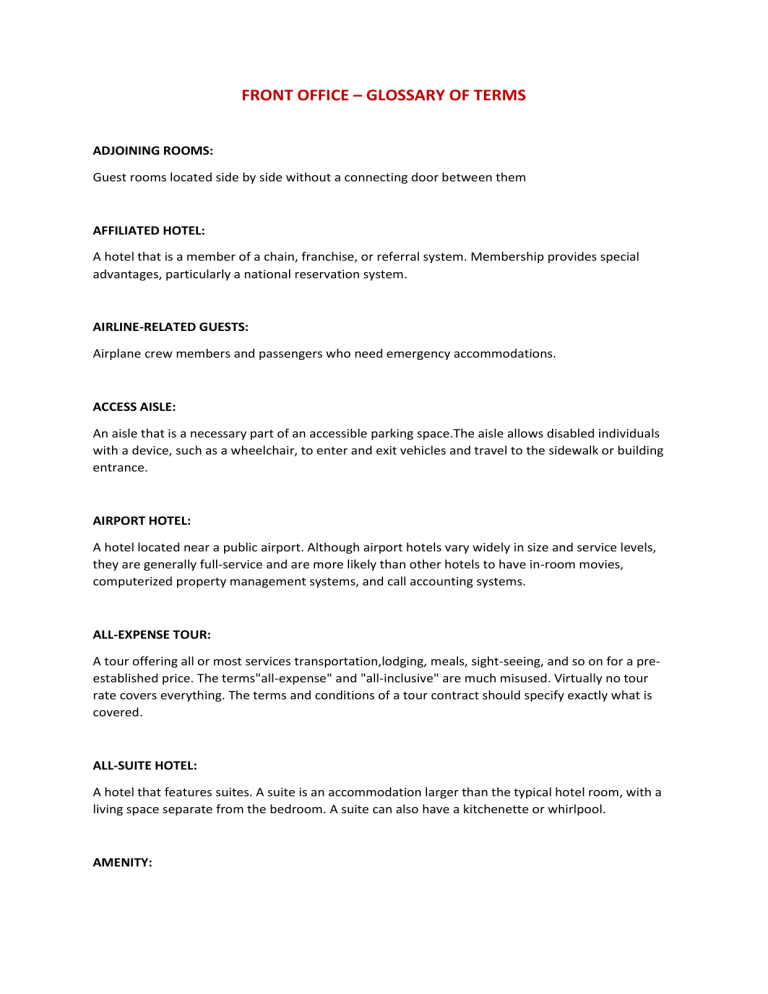
FRONT OFFICE – GLOSSARY OF TERMS ADJOINING ROOMS: Guest rooms located side by side without a connecting door between them AFFILIATED HOTEL: A hotel that is a member of a chain, franchise, or referral system. Membership provides special advantages, particularly a national reservation system. AIRLINE-RELATED GUESTS: Airplane crew members and passengers who need emergency accommodations. ACCESS AISLE: An aisle that is a necessary part of an accessible parking space.The aisle allows disabled individuals with a device, such as a wheelchair, to enter and exit vehicles and travel to the sidewalk or building entrance. AIRPORT HOTEL: A hotel located near a public airport. Although airport hotels vary widely in size and service levels, they are generally full-service and are more likely than other hotels to have in-room movies, computerized property management systems, and call accounting systems. ALL-EXPENSE TOUR: A tour offering all or most services transportation,lodging, meals, sight-seeing, and so on for a preestablished price. The terms"all-expense" and "all-inclusive" are much misused. Virtually no tour rate covers everything. The terms and conditions of a tour contract should specify exactly what is covered. ALL-SUITE HOTEL: A hotel that features suites. A suite is an accommodation larger than the typical hotel room, with a living space separate from the bedroom. A suite can also have a kitchenette or whirlpool. AMENITY: Service or item offered to guests or placed in guest rooms for the comfort and convenience of guests, and at no extra cost. Examples are various guest services (such as in-room entertainment systems, automatic check-out,free parking, concierge services, and multilingual staff) in addition to an array of personal bathroom items offered by most hotels and motels. Amenities are designed to increase a hotel's appeal, enhance a guest's stay, and encourage guests to return. AMERICAN PLAN: A room rate that includes three meals. ATRIUM: A guest room floor configuration in which rooms are laid out off a single-loaded corridor encircling a multistory lobby space; also the multistory lobby space, usually with a skylight. AUTOMATIC IDENTIFICATION OF OUTWARD DIALING: A feature of a call accounting system that immediately identifies the extension from which an out going call is placed. AUTOMATIC ROOM/RATE ASSIGNMENT: Computerized assignment made through algorithms based on parameters specified by hotel management officials. Rooms may be selected according to predetermined floor zones (similar to the way in which guests are seated in a dining room), or according to an index of room usage and depreciation. AVERAGE OCCUPANCY: A ratio that shows rooms sold over a fixed period of time as a percentage of total available rooms in a property over the same period of time. AVERAGE OCCUPANCY PER ROOM: A ratio that shows the average number of paid guests for each room sold. Calculated by dividing number of paid room guests by number of rooms sold. Measures management's ability to use the lodging facilities. AVERAGE ROOM RATE: A ratio that indicates average room rate, and to what extent rooms are being up-sold or discounted; calculated by dividing rooms revenue by number of rooms sold. Also called average daily rate or ADR. BACK OF THE HOUSE: The functional areas of a hotel or restaurant in which employees have little or no direct guest contact, such as kitchen areas,engineering and maintenance, and the accounting department. BAY: The principal compartment, generally of a suite, that is the space equivalent of a standard guestroom. A suite may have a single-bay or multiple-bay living room BED & BREAKFAST (B&B): A small inn or lodge that provides a room and a breakfast. Often a B&B is in a residential home setting and/or a historic building converted to a quaint lodging facility. BILLED-TO-ROOM CALL: An operator-assisted call that allows guests to have an operator place their calls and then advise the hotel of the charges. BILLING CLERK: The person responsible for charging to hotel guests all vouchers representing food, beverages, room service, and merchandise purchases. CABANA: A guest room adjacent to the pool area, with or without sleeping facilities CALL ACCOUNTING SYSTEM: A system that is part of the telephone equipment that prices telephone calls made by hotel guests and sends the information to the property management system (PMS) for billing. CALLING CARD: A credit card for making telephone calls; issued by either the local phone company or a long-distance company. CALLING CARD CALL: A call typically billed to a code number on a calling card issued by either the local phone company or a long-distance company, usually with a per-call surcharge. CANCELLATION: A reservation voided by a guest. CANCELLATION HOUR: A specific time after which a property may release for sale all unclaimed non-guaranteed reservations, according to property policy. CANCELLATION NUMBER: A number issued to a guest who properly cancels are servation, proving that a cancellation was received and acted upon. CARD KEY: A plastic card, resembling a credit card, used in place of a metal key to open a guest room door. Card keys require electronic locks. CASINO HOTEL: A hotel that features legal gambling, with the hotel operation subordinate to the gambling operation. CENTER CITY HOTEL: Full-service hotel located in a downtown area. CENTRAL RESERVATION OFFICE: Part of an affiliate reservation network. A central reservation office typically deals directly with the public, advertises a central (usually toll-free) telephone number, provides participating properties with necessary communications equipment, and bills properties for handling their reservations. CHAIN OPERATING COMPANY: A firm that operates several properties, such as Holiday Inn Worldwide or Hilton Hotels Corporation. Such an operator provides both a trademark and a reservation system as an integral part of the management of its managed properties. CHECK-IN: The procedures for a guest's arrival and registration. CHECK-OUT: The procedures for a guest's departure and the settling of his or her account.(2) A room status term indicating that the guest has settled his or her account,returned the room keys, and left the property. COMMERCIAL AGENCY: A travel agency that specializes in commercial business and usually has little or no walk-in clientèle COMMERCIAL HOTEL: A property, usually located in a downtown or business district, that caters primarily to business clients. Also called a transient hotel. COMMERCIAL TRAVEL: Travel for business purposes, not for pleasure. COMPLIMENTARY OCCUPANCY PERCENTAGE: A ratio that shows the percentage of occupied rooms that are complimentary and generate no revenue;calculated by dividing complimentary rooms for a period by total available rooms for the same period. Sometimes referred to simply as complimentary occupancy. COMPLIMENTARY ROOM: A complimentary or "comp" room is an occupied room for which the guest is not charged. A hotel may offer comp rooms to a group in ratio to the total number of rooms the group occupies. One comp room may be offered for each fifty rooms occupied, for example. CONCIERGE: An employee whose basic task is to serve as the guest's liaison with hotel and non-hotel attractions, facilities, services, and activities. CONDOMINIUM HOTEL: A hotel in which an investor takes title to a specific hotel room, which remains in the pool to be rented to transient guests when ever the investor is not using the room. The investor expects to receive a gain from the increase in value of the hotel over time, as well as receive ongoing income from the rental of his or her room. CONDUCTED TOUR: A pre - arranged travel program, usually for a group,that includes escort service. A sight-seeing program, such as a city tour, conducted by a guide. Also called an escorted tour. CONFERENCE CENTER: A specialized hotel, usually accessible to major market areas but in less busy locations, that almost exclusively books conferences,executive meetings, and training seminars. A conference center may provide extensive leisure facilities. CONFIRMED RESERVATION: An oral or written statement by the supplier (a carrier, hotel, car rental company, etc.) that he or she has received and will honor a reservation. Oral confirmations have virtually no legal worth. Even written or telegraphed confirmations have specified or implied limitations. For example, a hotel is not obligated to honor a confirmed reservation if the guest arrives after 6 p.m., unless late arrival is specified. Confirmed reservations maybe either guaranteed or non-guaranteed. CONNECTING ROOMS: Two or more guest rooms with private connecting door spermitting guests access between rooms without their having to go into the corridor. CONTINENTAL BREAKFAST: A small morning meal that usually includes a beverage, rolls, butter, and jam or marmalade. CONTINENTAL PLAN: A room rate that includes continental breakfast. CORPORATE HOTEL CHAIN: Hotel organization that has its own brand or brands, which may be managed by the corporate chain or by a conglomerate. CROUPIER: A casino employee who collects and pays bets and conducts game sat gaming tables. Also called a dealer. CRUISE SHIPS: Passenger ships designed for vacationers. Today's cruise ships feature a variety of activities and entertainment and can be thought of as floating resort hotels. CRUISE-ONLY AGENCY: A travel agency that sells only cruises. DAY RATE: A special room rate for less than an overnight stay DOMESTIC TOURISM: Travel within the traveler's country of residence DOORKNOB MENU: A type of room service menu that a housekeeper can leave in the guest room. A doorknob menu lists a limited number of breakfast item sand times of the day that the meal can be served. Guests select what they want to eat and the times they want the food delivered, and then hang the menu outside the door on the doorknob. The menus are collected and the orders are prepared and sent to the rooms at the indicated times. DOUBLE: A guest room assigned to two people. In beverage operations, a drink prepared with twice the standard measure of alcohol in one glass. DOUBLE OCCUPANCY PERCENTAGE: See Multiple Occupancy Percentage. DOUBLE OCCUPANCY RATE: A rate used for tour groups that bases the per-person charge on two to a room. DOUBLE-LOADED SLAB: A guest room floor configuration in which rooms are laid out on both sides of a central corridor. DOUBLE-LOCKED ROOM: An occupied room for which the guest has refused housekeeping service by locking the room from the inside with a dead bolt.Double-locked rooms cannot be accessed by a room attendant using a standard passkey EARLY ARRIVAL: A guest who arrives at the property before the date of his or her reservation. EARLY MAKEUP: A room status term indicating that the guest has reserved a nearly check-in time or has requested his or her room to be cleaned as soon as possible. ECO TOURISM: Low-impact tourism that avoids harming the natural or normal environment. In this relatively new approach to promoting enjoyment, as well as protection, of the environment, tourists seek out environmentally-sensitive travel and/or tours or vacations which, in some way, improve or add to their knowledge of an environment ESCORT: A person, usually employed by a tour operator, who accompanies atour from departure to return and serves as guide, trouble-shooter, etc. ESCORTED TOUR: A group of travelers traveling with a guide who has travel experience and has set up an itinerary for the group. EUROPEAN PLAN: A room rate that does not include any meals. EXECUTIVE FLOOR: A floor of a hotel that offers exceptional service to business and other travelers. Also called a business floor or the tower concept. EXPECTED ARRIVAL/DEPARTURE REPORT: A daily report showing the number and names of guests expected to arrive with reservations, as well as the number and names of guests expected to depart. EXPECTED ARRIVALS LIST: A daily report showing the number of guests and the names of guests expected to arrive with reservations. EXPECTED DEPARTURES LIST: A daily report showing the number of guests expected to depart, the number of stay-overs (the difference between arrivals and departures), and the names of guests associated with each transaction. FAMILIARIZATION (FAM) TOUR: A reduced-rate, often complimentary, trip or tour offered to travel agents, wholesalers, incentive travel planners, travel writers, broadcasters, or photographers to promote a hotel or a destination. FAMILY LIFE CYCLE: A series of stages used to distinguish between types of travelers; variables used to determine family life cycle stages are age, marital status, and presence and ages of children. FAMILY RATE: A special room rate for parents and children occupying one guestroom FLY CRUISING: A travel trend in which tourists fly to a destination to begin a cruise, generally as part of a travel package FOLIO: The guest's bill that all hotel and incidental charges are posted to. FOREIGN INDEPENDENT TOUR (FIT): A tour created for individuals or families who walk into a travel agency and tell an agent what country or are at hey would like to visit and what they would like to see FRONT DESK: The focal point of activity within the hotel, usually prominently located in the hotel lobby. Guests are registered, assigned rooms, and checked out at the front desk. FRONT DESK AGENT: A hotel employee whose responsibilities center on the registration process, but also typically include preregistration activities, room status coordination, and mail, message, and information requests. FRONT OF THE HOUSE: The functional areas of a hotel or restaurant in which employees have extensive guest contact, such as the front desk (in hotels) and the dining room(s). FRONT OFFICE: A hotel's command post for processing reservations, registering guests, settling guest accounts, and checking guests in and out FULL-SERVICE AGENCY: A travel agency that handles all types of travel for consumers. FULL-SERVICE HOTEL: A hotel with a full range of services service and amenities which may include some or all; on site restaurant and lounge, meeting facility, pool, fitness center, business center, etc. GLOBAL DISTRIBUTION SYSTEM (GDS): A network of internet reservation systems that provide a central place where travelers and travel agents can check availability and reserve travel related products like hotels, airline, car rentals, cruises, rail. Formed and managed by the airline industry and includes system like Sabre, Apollo, Amadeus, and Pegasus. GRAND TOUR, THE: An extended trip across the European continent that served as part of the education of young British aristocrats. A typical tour began in England and had the major cultural cities of Italy as its destination. In its early years, a tour could last as long as 40 months. By the end of the Grand Tour era,the age of the traveler had increased, and the length of the tour decreased;individuals traveled more for pleasure than for an extended educational tour. The Grand Tour era lasted from about 1500 to 1820. GROUP PICK-UP: The guest rooms that are actually rented by a group that are help in a Group Reservation. GROUP RESERVATIONS: A block of multiple guest rooms that are being held under an individual or business' name at a particular hotel for a specific date or range of dates. Generally used for conventions, conferences, meetings,receptions, weddings, etc. GUEST COMMENT CARD: Short questionnaires that lodging properties and food service establishments ask their guests to fill out. Guest comments are used by the property to define current markets and to improve the operation. GUEST HISTORY CARD: A record of the guest's visits including rooms as signed rates, special needs, and credit rating. GUEST HISTORY FILE: A file containing guest history cards. It is maintained for marketing purposes and is referred to for return visits. GUEST INFORMATION SERVICES: Automated information devices in public hotel areas that enable guests to obtain information about in-house events and local activities. . GUEST PROFILE: A list of the characteristics that a property's guests have in common. The guest profile helps management to identify which market segments the property appeals to and which segments the property wants to attract. GUEST RELATIONS: The establishment of personal rapport and goodwill with guests through service and attention to individual guest needs. In a narrower sense, the promotion of in-house products and services,the entertainment of VIPs, and the handling of social functions--especially in are sort hotel. GUARANTEED RESERVATIONS: A reservation that is guaranteed by the guest to be paid even if the guest fails to arrive. Often this guarantee is made by a company or with a credit card. GUEST SERVICE MANAGER (GSM): Manager of the guest services department. GUEST SERVICE REPRESENTATIVE (GSR): Employees who provide check-in check-out, mail, key, message, and information services for guests. GUESTROOM CONTROL BOOK: A book used to monitor the number of guestrooms committed to groups. It controls guest room booking activity by providing the sales office with the maximum number of guest rooms it can sell to groups on a given day. The remaining guest rooms (and any unsold guest rooms allotted to groups) are available for individual guests. GUESTROOM KEY: A key that opens a single guest room door if it is not double-locked. GUESTROOM MAINTENANCE: A form of preventive maintenance involving the inspection of a number of items in the guest room, minor lubrication of doors and other equipment, repair of obvious small problems and, when needed, the initiation of a work order for more substantial problems or needs. HOSPITALITY: The cordial and generous reception of guests. Derived from the Latin term hospes, "a guest." HOSPITALITY INDUSTRY: Lodging and food service businesses that provide short-term or transitional lodging and/or food. HOSPITALITY SUITE: A room used for entertaining (e.g., a cocktail party); usually a function room or parlor. HOTEL: A large lodging facility, generally a hotel is full service and a multi-story building with interior entrance guest rooms. HOTEL CHAIN: A group of affiliated hotels. HOTEL GUEST CYCLE: The sequence of phases that begins with pre- sale events, continues through point-of-sale activities, and concludes with post-sale transactions. The phases identify the physical contacts and financial exchanges that occur between guests and various revenue centers within a lodging operation. HOTEL MANAGEMENT COMPANY: A company that is hired to professionally manage a hotel(s) for other owners. HOTEL REPRESENTATIVE: An individual who offers hotel reservations to wholesalers, travel agents, and the public. A hotel representative or "rep" maybe paid by the hotels he or she represents on a fee basis or by commission.Many hotel reps also offer marketing and other services. HOUSE LIMIT: A guest credit limit predetermined by management officials. HOUSEKEEPING DEPARTMENT: A department of the rooms division,responsible for cleaning the hotel's guest rooms and public areas INCENTIVE TRAVEL: Travel financed by a business as an employee incentive. INCLUSIVE TOUR: A tour in which specific elements--air fare, hotels,transfers, etc.--are included for a flat rate. An inclusive tour rate does not necessarily cover all costs. INDEPENDENT FOOD SERVICE OPERATION: An operation owned by an owner or owners with one or more properties having no chain relationship. Menus, food purchase specifications, operating procedures, etc. may differ among the owned properties. INDEPENDENT HOTEL: A hotel with no chain or franchise affiliation. It may be owned by an individual proprietor or a group of investors. IN-ROOM GUEST CONSOLE: A multi-feature phone that may include such functions as two-way speaker phone capability; a jack for portable computer use; an alarm clock; radio; remote control of heating, ventilating, and air conditioning, television, and room lights; energy management; and a theft alarm. IN-ROOM MOVIE SYSTEM: Guest room entertainment provided through a dedicated television pay channel. Charges for the use of this in-room entertainment are posted to the appropriate guest folio. INN: A smaller lodging facility, generally an inn is limited service and one to three stories. INTERNATIONAL TOURISM: Travel people make outside their country of residence. KING BED: A bed approximately 78 inches by 80 inches LANAI: A guest room with a balcony or patio, overlooking water or a garden. LANDMARK: Distinguishing feature that stands out and provides a reference point for orientation. Landmarks also provide travelers with information about direction and distance. LATE ARRIVAL: A guest holding a reservation who plans to arrive after the property's designated cancellation hour and so notifies the property. LATE CHECK-OUT: A guest who is being allowed to check out later than the property's standard check-out time. LIMITED SERVICE HOTEL: A lodging facility that offers no or very few amenities, services or extra facilities such as restaurants, pools, meeting rooms,etc. Generally an inn or motel is limited service LONG-TERM STAY/RELOCATION GUESTS: Those individuals or families relocating to an area who require lodging until permanent housing can be found. LODGE: A lodging facility that is generally small and often designed in located in a rustic outdoors environment or activities such as; fishing, skiing,boating, Eco-tours. LODGING FACILITY: A business that rents guest rooms to the public on a nightly or shorter term range of dates, i.e. weekly, month to month. LODGING INDUSTRY: Lodging and food service businesses that provide short-term or transitional lodging. LUXURY HOTEL: A hotel with high room rates that features exceptional service and amenities. MASS TOURISM: Wide-scale travel by a large number of people--not just the elite--brought about by the increase in leisure time, discretionary income,and reliable and inexpensive modes of transportation such as the automobile and airplane. MASS TOURISTS: Travelers participating in wide-scale travel designed for large numbers of people. MASTER FOLIO: A bill that all charges for the members of a group are posted to. MASTER KEY: A key that can open all guest room doors that are not double-locked MID-PRICE/EXTENDED-STAY HOTELS: Hotel that caters mostly to persons who must be in an area for a week or longer. The guest rooms of mid-price/extended-stay hotels have more living space than regular hotel guestrooms, and may also have cooking facilities. Guest rooms in these hotels tend to be less expensive than guest rooms in full-service or all-suite hotels. MID-RANGE SERVICE: A modest but sufficient level of service that appeals to the largest segment of the traveling public. A mid-range property may offer uniformed service, airport limousine service, and food and beverage room service; a specialty restaurant, coffee shop, and lounge; and special rates for certain guests MOTEL: A smaller lodging facility, generally a motel is limited service and one to two stories with exterior entrance rooms that guest can drive up to. Often referred to as motor hotel. NATIONAL TOURISM OFFICE: Primary government agency responsible for implementing national goals and public policy with respect to tourism, and for providing information services to international travelers OCCUPANCY REPORT: A report prepared each night by a front desk agent that lists rooms occupied that night and also lists those guests expected to check out the following day. OCCUPIED: A room status term indicating that a guest is currently registered to the room. ONLINE RESERVATION SYSTEM: An internet based system used by hotels that allows prospective hotel guests to check availability and make reservations at the hotel. OVERBOOKING: Accepting reservations that exceed available rooms. OVERSTAY: A guest who remains at the property after his or her stated departure date. PACKAGE: A special offering of products and services created by a hotel to increase sales. There are weekend packages, honeymoon packages, sports packages, and so on. A typical package might, for a special price, include the guest room, meals, and the use of the property's recreational facilities. PACKAGE TOUR: A tour put together by a tour packager or operator.Travelers who buy the package make the trips by themselves rather than with a large group. The package offers, at an inclusive price, several travel elements which a traveler would otherwise purchase separately--any combination of lodging; sightseeing; attractions; meals; entertainment; car rental; and transportation by air, motor coach, rail, or even private vehicle. A package tour may include more than one destination. POINT OF SALE SYSTEM (POS): Computerized systems that retail outlets such as restaurants, gift shops, etc, enter orders and maintain various accounting information. The POS generally interfaces with the property management system (PMS). PROPERTY MANAGEMENT SYSTEM (PMS): A computerized front desk system that manages hotel room inventory, guest billing and interfaces with various other systems such as telephone, call accounting, point of sale (POS),entertainment, etc. PROPRIETARY BOOKING ENGINE: A internet reservation system that is owned and operated by an individual hotel or group of hotels to allow them to take reservation on their own website without paying a fee to the GDS, third party booking engines or franchise reservation systems QUAD: A guest room assigned to four people; may have two or more beds. QUALITY GROUP: The group of travelers for whom the quality of their vacation is of paramount importance. They want and are willing to pay for first-class accommodations and service. QUEEN: A bed approximately 60 inches by 80 inches RACK RATE: The current rate charged for each accommodation as established by the property's management RESERVATIONS: A guest room that being held under an individual or business' name at a particular hotel for a specific date or range of dates. RESERVATIONS AGENT: An employee, either in the front office or in a separate department, who is responsible for all aspects of reservations processing. RESERVATIONS DEPARTMENT: A department within a hotel's rooms division staffed by skilled telemarketing personnel who take reservations over the phone, answer questions about facilities, quote prices and available dates,and sell to callers who are shopping around. RESIDENT MANAGER: The manager in charge of the rooms division in amid-size to large hotel. Sometimes resident managers are also in charge of security. RESORT HOTEL: A hotel, usually located in a desirable vacation spot, that offers fine dining, exceptional service, activities unavailable at most other properties, and many amenities. ROOM BLOCK: An agreed-upon number of rooms set aside for members of a group planning to stay at a hotel. ROOM DATA CARD: A card used to record information concerning the basic characteristics and major elements of an individual guest room ROOM OCCUPANCY SENSOR: A device that uses infrared light or ultrasonic sound waves to sense the physical occupancy of a room. Sensors have the ability to turn on devices and appliances such as lights, air conditioning, and heating whenever a guest enters a space, and to turn these devices and appliances off when the guest leaves. ROOM RACK: A card index system that is constantly updated to reflect occupied and vacant rooms. In the evening, the room rack contains forms for only those registered guests remaining for the night who are to be charged for rooms. A daily room report can be prepared from the room rack. ROOM RATE: The price a hotel charges for overnight accommodation. See also Rack Rate. ROOM STATUS: Information about current and future availability of guestrooms in a lodging property. Current availability is determined through housekeeping data. Future availability is determined through reservations data. Information about availability data which extends several days into the future is important because it may affect the length of stay of in-house guests. ROOM STATUS DISCREPANCY: A situation in which the housekeeping department's description of a room's status differs from the room status information that guides the front desk employee in assigning rooms to guests.Discrepancies can seriously affect a property's ability to satisfy guests and maximize room’s revenue. ROOMING LIST: A list of the guests who will occupy reserved accommodations. This list is submitted in advance by the buyer. ROOMS ALLOTMENT REPORT: A report that summarizes rooms committed (booked or blocked), by future date ROOMS CHECKLIST: A list, used for guest room (preventive)maintenance, of all the items in the guest room with a brief notation opposite each item of the type of inspection, repair, lubrication, adjustments, or cleaning activity to be performed. ROOMS DISCREPANCY REPORT: A report that notes any variances between front desk and housekeeping room status updates. It often alerts management to investigate the possibility of sleepers. See Sleeper. ROOMS DIVISION: The largest, and usually most profitable, division in a hotel. It typically consists of four departments: front office, reservations,housekeeping, and uniformed service. ROOMS HISTORY REPORT: A computer-based report that depicts there venue history and use of each room by room type. This report is especially useful to those properties employing an automatic room assignment function. ROOMS STATUS REPORT: A report that indicates the current status of rooms according to housekeeping designations, such as: on-makeup, on-change,out-of-order, clean, and ready for inspection. SCIENCE TOURISM: A subgroup of ecotourism in which laypersons travel with scientists and students to help with scientific work at various sites throughout the world. Science tourists often work very hard (even though they are paying for the vacation) and make a contribution to a body of scientific knowledge. SERVICE CHARGE: A percentage of the bill (usually 10% to 20%) added to the guest charge for distribution to service employees in lieu of direct tipping. SIDE-BY-SIDE SUITE: A suite that consists of two small bays, each with windows to the outside. SINGLE BED: A bed approximately 36 inches by 75 inches. SKIPPER: A guest who leaves without paying. SLEEPER: A vacant room that is believed to be occupied because the roomr ack slip or registration card was not removed from the rack when the previous guest departed. SPA: A mineral spring, or a locality or resort hotel near such a spring, to which people resorted for cures (from Spa, a watering place in eastern Belgium).To day, the word spa is used more loosely to refer to any fashionable resort locality or hotel. STAY OVER: A room status term indicating that the guest is not checking out and will remain at least one more night STUDIO: A guest room having one or two couches that convert into beds. SUITE: (1) A guest room with a parlor area in addition to a sleeping room,and perhaps a kitchenette. (2) Several pieces of furniture of similar design, usually sold together to outfit a complete room. SUITE HOTEL: A hotel whose sleeping rooms have separate bedroom and living room or parlor areas, and perhaps kitchenettes TOUR: Any pre-arranged (but not necessarily prepaid) journey to one or more places and back to the point of origin. TOUR BROKER: An individual licensed and bonded by the Interstate Commerce Commission to operate motor coach tours in the United States and, in some cases, Canada, as permitted by the scope of his or her license. Also known as a motor coach broker or tour operator. TOUR OPERATOR: A business that puts together travel tours and sells them directly to individuals or through travel agencies. TOURISM DEVELOPMENT: The long-term process of preparing for the arrival of tourists; entails planning, building, and managing attractions, transportation, accommodation, services, and facilities that serve the tourist. TOURISM ENCLAVE: Self-contained resort complex that caters to all the needs of tourists who arrive as part of a tour or other type of package. TOURISM PLANNING: The process of preparing for tourism development;a tool for addressing the choices associated with tourism development. TOWER: A guest room floor configuration in which rooms are grouped around a central vertical core. TRANSIENT HOTEL: Lodging operation that caters primarily to businesspeople; transient hotels tend to be busiest Monday through Thursday. TRAVEL CLUB: A type of travel agency that charges an annual fee to its members and in return offers packaged vacations to members at reduced prices. TWIN: A guest room with two twin beds. TWIN BED: A bed approximately 39 inches by 75 inches. UNDER STAY: A guest who checks out before his or her stated departure date UPGRADE: To move to a better accommodation or class of service. VACANT: A room status term indicating that the room has been cleaned and inspected, and is ready for the arriving guest. VILLAGE STAY: An alternative form of tourism in which the tourist can experience life in a rural place--fishing village, farm, historic village, etc.--by staying in the home of a resident, in a dormitory, or in some other type of accommodation VOICE MAIL: A system that is part of the telephone equipment which provides for hotel guests and staff to retrieve a message left by a caller. WALK-IN GUEST: A guest who arrives at a hotel without a reservation WALKING A GUEST: A situation in which a hotel is unable to honor a guest's reservation and helps the guest find accommodation elsewhere. WATER PARK HOTEL: A hotel that offers a large recreational water elements such large pools, multiple pools, slides or other water related venues. YACHT CLUB: A private club located near a large body of water, whose main purpose is to provide facilities such as marinas to boat owners. 0 - CALL (Zero - Call): A telephone call placed with an operator's assistance. Examples may include calling- and credit-card calls, collect calls, and third-party calls. ZONE LIGHTING: Lighting designed to facilitate traffic from one space to another. THIRD PARTY BOOKING ENGINE: An internet site that provides a booking engine where a traveler can search a large number of lodging facilities for availability and reserve a room. The lodging facilities are not affiliated with the site and pay a fee for the business that the third party site generates.Examples of third party sites include; hotels.com, price line.com


